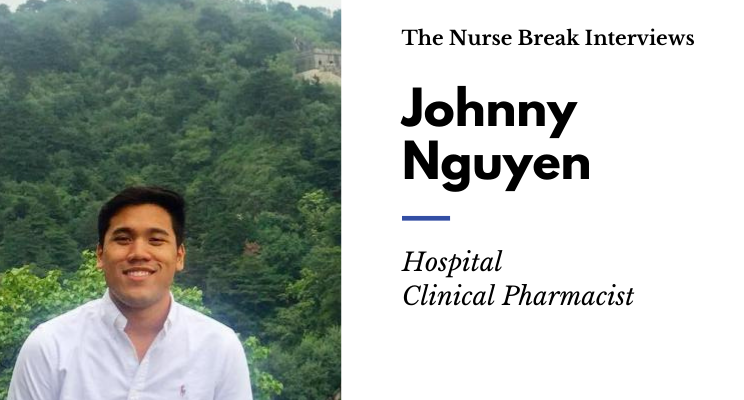Table of Contents
Meet Hospital Pharmacist Johnny. Below he outlines things you may not realise about pharmacy, how nurses and pharmacists can work better together and his advice in general! For more articles from nurses, doctors, allied health and to learn how we can all work better together go here and choose a category!

About me
Hello! I’m Johnny and I am a clinical pharmacist working at the Royal Melbourne Hospital. I studied at Monash University and have recently completed a graduate certificate in pharmacy practice, focusing on evidence-based practice and infectious diseases. I am also credentialled as part of the Partnered Pharmacist Medication Charting (PPMC) model, which allows me to chart medications on behalf of the medical team. Currently, I am based in the Acute Medical Unit, which usually cares for medical patients (in particular geriatrics), but for the majority of 2020 was converted into a COVID ward and currently is still screening potential COVID patients.
What type of pharmacist am I?
Hospital pharmacists rotate through different clinical areas of the hospital to develop a thorough understanding of different areas of medicine and practice, keeping our knowledge up to date and broadening our scope of practice, before eventually deciding on a speciality. My interests currently lie in general medicine, emergency medicine and stroke care.
What does your typical day look like?
Clinical pharmacists play an important role in a multidisciplinary team, sharing a common goal in improving patient outcomes. We are involved in the care of every patient from admission through to their discharge, which can sometimes become an intricate dance on top of everything else we do. As well as ensuring safe and timely access to medications, we provide clinical reviews, prescribing advice and dosing recommendations to other healthcare professionals, in particular doctors and nurses.
A major aspect of our practice involves gathering an accurate medication history to ensure prior to admission medications are not missed or omitted during a patient’s stay; the last thing we want is a flare-up of their pre-existing condition on top of their current presenting complaint.
But that’s just the tip of the iceberg! We have pharmacists in antimicrobial stewardship, peri-operative services, hospital in the home, renal transplant and gastroenterology, just to name a few!
What are the biggest misconceptions about your field?
Many patients (and even some healthcare workers) believe that the sole role of a pharmacist is to supply medications to the ward and patients. They are not wrong in making this assumption, but that is just a tiny part of what we do day to day. Clinical pharmacists do much more than this (as mentioned) and it is a view I am hoping to change!
How can pharmacists make nursing easier?
“Is this dose correct? How do I administer this medication? Where do I get this medication?” I’m sure you’ve had a medication-related question before and thought about who you could ask. Well, that’s where your pharmacist comes into the picture. Pharmacists and nurses can work together incredibly well, combining the experience and expertise of both professions to ensure our patients receive the treatment and care they deserve.
So, take the opportunity to say hello to your pharmacist. Whether your question is medication-related or not – we can point you in the right direction!
What do you wish you had known before you started your career as a pharmacist?
If you had asked me what the role of a pharmacist was in high school, I would have naively told you that they were responsible for the dispensing of prescriptions. However, since completing my studies and working at the Royal Melbourne Hospital, I can say that pharmacists have an immense role in patient care, playing a crucial part in medication optimisation as well as education to both our nursing and medical colleagues.
How has COVID-19 impacted the role of pharmacists in 2020?
The COVID pandemic required pharmacist’s to be creative and think outside the box when it came to the provision of medication & patient counselling. The usual face to face communication was not always appropriate, in particular when dealing with COVID positive patients. Already in PPE, the use of phones & telecoms was becoming the new norm during the peak of the pandemic. Medications were delivered to the door, or prescriptions were emailed to a patient’s local pharmacy, quarantined for many days and then eventually mailed out.
We now have pharmacists based at all COVID vaccinations sites, involved in the supply, storage and preparation of the COVID vaccine, with community pharmacists on the front line administering as well.
What advice would you have for students & aspiring pharmacists?
The pharmacy profession is one that is continually growing, with pharmacists now working in many speciality areas including COVID vaccination, an area expanding at a rapid pace. At the time of choosing this career pathway, I lacked insight into the many aspects of pharmacy practice, which made the decision difficult. Had I known more about pharmacists and their experiences and expertise in their field, the decision would’ve been made much sooner and with no hesitation.
It would be wise for those looking at a career in pharmacy to get exposure beyond the community setting and be pro-active in getting experience throughout the completion of their university degree. The opportunities are endless.
What’s next for your career?
As mentioned, my interests lie in general medicine, emergency medicine and stroke care. I have completed my residency at the Royal Melbourne as well as post-graduate studies at Monash University. My goal is to eventually complete an advanced training residency program with the aim of enrolling in a Master of Public Health, before finally becoming a specialist pharmacist in one of my areas of interest.
What’s your favourite medicine and why?
Some would say this is a boring answer, but paracetamol would be my medication of choice. It is a medication that is grossly underestimated but is widely available, affordable and used by many patients in the hospital and the community setting. It has a role in many situations such as pain or fever, whether it be as a sole agent or in conjunction with other treatments. So, the next time you’ve got a headache, don’t underestimate paracetamol.






You must be logged in to post a comment.